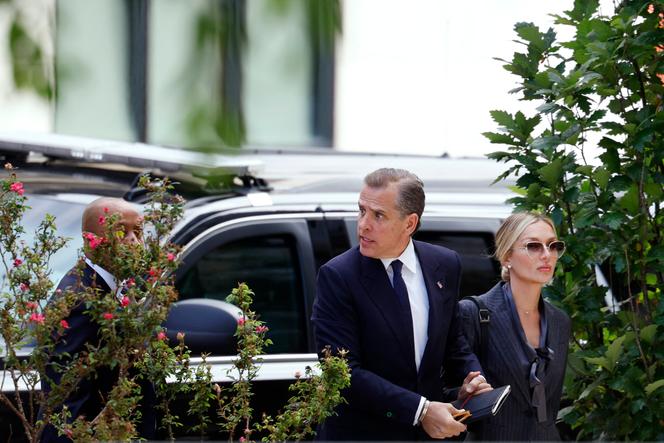


Hunter Biden's afflictions have been making the tabloids for years. The president's troubled son is now fighting on three fronts. The first two are legal. On Monday, June 3, a trial opened against him in Delaware for illegal possession of a firearm. Hunter Biden has also been charged with nine counts of tax fraud and will stand trial in this separate case in California in September, two months before the presidential election.
This creates a third front, a political one. Hunter Biden is a potential liability for the Democratic president, identified as such by Republicans and the conservative media. These media are determined to create a form of mirror effect or false equivalence with Donald Trump's recent conviction in New York for falsifying documents.
The trial in Delaware, which began with jury selection, could unveil embarrassing details – about facts nonetheless already widely known – about Hunter Biden's private life at the time of the events, from sexual encounters to drug binges. On October 12, 2018, he walked into a Wilmington gun shop to purchase a Colt Cobra revolver. On the official form, when asked about drug use, the president's son answered "No."
Eleven days later, Hunter Biden was sleeping over at the home of Hallie, the widow of his brother Beau, the family's prodigy son, who tragically died of brain cancer in 2015. Fueled by shared grief and inner frailties, their love affair was no secret. It had led to Hunter's divorce from his wife, Kathleen, in 2017. That day, Hallie found the revolver he bought in his pick-up truck. On a whim, she decided to get rid of it, throwing it in the trash of a nearby grocery store.
One year ago, Hunter Biden thought he would escape trial for the firearm incident, but he would have to face court for the approximately $1.4 million (€1.28 million) in back taxes that had not been declared between 2016 and 2019. In the spring of 2023, his lawyers reached a plea agreement with the office of Delaware federal prosecutor David Weiss, who was appointed under Trump.
But on July 26, 2023, Judge Maryellen Noreika decided she wouldn't accept the deal. The document stated that the defendant had admitted responsibility for two minor tax offenses and had escaped prosecution for illegal possession of a weapon by participating in a two-year rehabilitation program for non-violent offenders.
This compromise agreement had already been shaky for a number of months, due to the Republican offensive in the House of Representatives, denouncing preferential treatment and accusing the Biden family more broadly of corruption and illegal enrichment abroad. Accusations of preferential treatment were backed up by the testimony of IRS former members, including Gary Shapley. Shapley claimed that US Attorney Weiss had been prevented by colleagues in California and Washington from initiating broader prosecutions against Hunter Biden. He then asked the Justice Department to appoint him as special prosecutor, a claim which Weiss formally denied.
You have 36.19% of this article left to read. The rest is for subscribers only.
